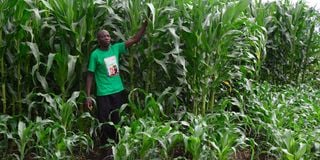
Meshack Koech displays maize crop in two stages at a farm in Munyaka, Ainabkoi Constituency, Uasin Gishu County on May 22, 2024.
Almost a century after independence, Africa still can’t feed itself, though 60 per cent of the world’s arable land is on the continent. A third of us in sub-Saharan Africa are food insecure, we are not guaranteed a proper meal, not even smokies, mayai gonga and kachumbari.
And it is getting worse; the proportion of Africans who do not have access to enough food to sustain a normal, active lifestyle is rising, 23 per cent in 2023 up from 18 per cent eight years earlier.
What’s the problem? I have read an interesting article by Jonathan Rosen in MIT Technology Review about the food question in Africa and it is clear that the biggest problem is that Africa is growing the wrong food, particularly grains: maize, our favourite, rice and wheat. White ugali certainly might taste better than brown, finger millet ugali, and chapati is king. And how can there be a wedding without rice?
But traditional grains like sorghum and millet have way more nutrients, are good for our soils, require less water and no artificial fertilisers. A maize farmer must grow his crop with DAP and weed with CAN, among a witch’s brew of other chemicals for pests and to support growth.
Commercial settler farmers in the colonial days favoured maize varieties that yielded more and were therefore more profitable, whose processing could be mechanised but which were nutritionally poorer than the native varieties grown here since 1600, I have learnt from Mr Rosen.
Net food importer
Our “indigenous” maize, the varieties grown before colonialism, are almost certainly extinct, just like many other crops that our governments and institutions made no organised effort to preserve. The crops and varieties we have adopted are less able to withstand increases in temperature and a reduction in rainfall, the main consequences of climate change. In another 30 years, we will be able to grow very little of it.
I think we should go to the beginning and ask ourselves: what is the point of our agriculture? Agriculture provides a livelihood to 70 per cent of Africans, according to Google’s AI wizards. So we farm for a living. But we only account for 10 per cent of the world’s food output, are a net food importer spending a billion dollars a year rather than feeding the rest of the world, which we should given our land and water resources. Why is this the case?
I suppose part of the reason is that a lot of thinking is outsourced to Western research institutions and strange foundations because we do not prioritise research in the same way we do roads, for example, or airports and the electric grid. There are no kickbacks in research, you see.
It appears that a lot of research in health and agriculture is either funded or carried out by foreign governments or other international bodies. We need to lift the log and look underneath to establish why they are doing that and why, despite all that good work, our situation keeps getting worse.
Traditional food crops
I think we need to have simple political, policy and research alignment on the targets for our agriculture. For example, we need to be clear that we need to provide our growing population with adequate nutrition from a set date until forever. That means selection of the right crops, perhaps a period of changing people’s attitudes to traditional crops, development of better varieties, seed management, production and storage systems and distribution chains.
Secondly, we have to make farms pay. The potential for coffee, tea, horticulture, fruit and other things like herbs in Kenya is significant. The problem with many of these crops is that the institutions around which they are produced require some political saviour either to stop some cross-eyed Galla goats from stealing farmers’ money or to allegedly trot the globe, poking a puzzled big nose into warehouses in Munich apparently “looking for markets for our coffee”.
My own thinking is that commercial and cash crop farming should stop being government-driven, as a matter of fact, the politicians should get out of the way, and let farmers and scientists, the people who have invested their money, energy and passion, take the lead. Personally, I’m going back to coffee at a moderate scale and I want nothing from the government or the cooperatives.
We’ll start building momentum when farmers can grow, process and market their own crops, even if they are not mega scale. I am also going to grow traditional crops at a scale that I no longer see. Fortunately, some of the traditional food crops have the best returns of any crop in production in my region today.
And my objective is simple: I want my farm to feed me and the community around us and put some dollars in my account without me having to finya a laptop or being exported to the Middle East. As a society, we miss the bus because the people don’t set the agenda, politicians do. Believe you me, food on the table is more important than the impeachment.
Mr Mathiu, a media consultant at Steward-Africa, is a former Editor-in-Chief of Nation Media Group. [email protected].










